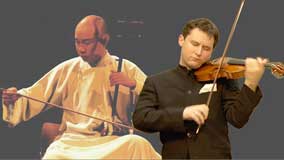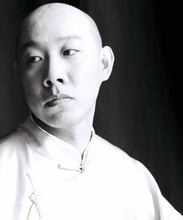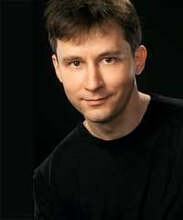
CONCERT IX
Saturday, February 19, 2011, 2:00 p.m.
Old Capitol Museum Senate Chamber (map)
EAST meets WEST
a collaborative concert featuring
GuoGan, erhu (Paris)
Wolfgang David, violin (Vienna)
with School of Music Faculty
Scott Conklin, violin, Daniel Moore, percussion
Volkan Orhon, double bass, David Gompper, piano
|| download program ||
Program
| Paper Fortunes for erhu, two violins and piano I. Red Lanterns II. Paper Cranes III. Nine Fish |
HU Ching-chu (b. 1969) |
|
| A Song for New Year's Eve | LIU Tian-Hua (1895-1932) |
|
| Meditation (from Thaïs) | Jules MASSENET (1842-1912) |
|
| Mélodieux | GUO Gan (b. 1968) |
|
| Shanghai Expo | ||
| — Intermission — | ||
| Carmen-Fantasy, op. 25 (1883) | Pablo de SARASATE (1844-1908) |
|
| Tambourin chinois for violin and piano |
Fritz KREISLER (1875-1962) |
|
| Horse Races for erhu, violin, double bass, percussion and piano |
David GOMPPER (b. 1954) |
|
| A 30-minute question and answer session with Guo Gan and Wolfgang David follows immediately after the recital. |
||
Performers

In 1987 he entered the Shenyang Music Conservatory and in 1991 won a prize with honors for his work on the erhu. From 1991 to 1994, GUO Gan performed often in recital with erhu and percussion groups, and played for dance and theater companies throughout Liaoning Province. In 2001, GUO Gan moved to Paris to enlarge his musical experience, and subsequently enrolled in the Ecole Nationale de Musique where he continued his training in jazz percussion. Since then he has performed with many dance groups and in orchestral projects that feature the erhu with its western counterpart, the violin. Guo Gan has worked with many composers and western musicians, including film composers Javier Navarrete (Sa Majeste Minor), and Armand Amar (Le pemier cri) and musicians such as Lang Lang (Carnegie Hall, 2009). GUO GAN, who has become the unofficial emissary of the erhu in France, has been interviewed by TF1, FR3 and France 4. Everywhere he goes, whether in Europe or in Asia, his mix of Western and Asian musical styles plays to a public that is becoming ever more widespread. For more information, consult the performer's websites at www.guogan.fr/en/index.php. |
|||

Admitted to the University for Music in Vienna at the age of eight, David studied there for many years with Rainer Küchl, the concertmaster of the Vienna Philharmonic Orchestra. Later he continued his studies at the Musikhochschule in Cologne with Igor Ozim and with Yfrah Neaman at the Guildhall School of Music in London. The winner of many competitions and prizes, David has performed in major halls such as Konzerthaus and Musikverein Hall in Vienna, Carnegie Hall in New York, Cerritos Center in Los Angeles, the Wigmore Hall in London, Victoria Hall in Geneva, and Philharmonie in Cologne. Highlights of his career included concerts at the Great Assembly Hall of the United Nations in New York in the presence of Secretary General Kofi Annan, and a concert in Bangkok, given for the Queen of Thailand. Wolfgang David performs on a violin built in 1715 by Carlo Bergonzi, Cremona, on exclusive loan to him from the Austrian National Bank. Wolfgang David has recorded a CD with the Royal Philharmonic Orchestra under the baton of Emmanuel Siffert and three albums with the American pianist David Gompper. In December 09 he has recorded another CD with the Royal Philharmonic Orchestra, which will be released on the NAXOS label in the beginning of 2011. For more information, consult the performer's websites at www.wolfgangdavid.com. |
|||

Scott Conklin violin |

Daniel Moore percussion |

Orhan Volkan double bass |

David Gompper piano |
Program Notes
The impetus for today's recital grew out of a concert that took place last year, when Wolfgang David was invited to perform with Guo Gan at the Victoria Hall in Geneva and the UNESCO Hall in Paris. The organizer, Mehri Madarshahi who is president of "Melody for Dialogue Among Civilization Association," engaged them in a concert of Western and Eastern music. She is an active concert promoter in Paris who helps to bring together a dialogue among civilizations, cultures and communities. See: www.melodydialogue.org.
HU Ching-chu
Paper Fortunes
is a collection of three miniatures reflecting Chinese-American culture. The title refers to words of wisdom typically found in fortune cookies, a staple of Chinese restaurants in the United States, but which actually are not Chinese at all. Along these lines, I thought it best to write melodies that reference Chinese tunes, and not by a direct appropriation of folk music. To that end, the combination of erhu and two violins were immediately appealing to me, and the addition of some extended techniques for the piano allowed a balance of sound to create a lighter texture. In "Red Lanterns," the violins and erhu try to "catch" one another. The piano joins in the second movement, "Paper Cranes." This movement is a lyrical solo for the erhu, while the violins emerge from the texture at points to overtake the lines. In "Nine Fish," the main motive is presented in the form of a rondo.
I wish to thank Guo Gan, Wolfgang David, Scott Conklin and David Gompper for the opportunity to write for such amazing musicians.
Ching-chu Hu's music has been performed in the United States, England, Germany, Russia, Austria, China, Taiwan, and Australia. Recent honors have included composer-in-residence at the Piccolo Spoleto Festival, and guest composer at the American Music Week Festival in Sofia, Bulgaria. Hu has been a composition fellow at the Aspen and Bowdoin Music Festivals, Yaddo, The MacDowell Colony, and the Banff Centre for the Arts. He has received performances in various national and international festivals and concerts, including the Alternativa Festival (Center "DOM") in Moscow. Born in Iowa City, Iowa, Ching-chu Hu studied at Yale University, Freiburg Musikhochschule in Freiburg, Germany, The University of Iowa, and the University of Michigan, where he earned his Doctorate of Musical Arts in Composition. He is active as a pianist and conductor, and wrote the scores for several short award-winning films. Upcoming commissioned projects include a work for the Western Springs School of Talent Education Program's 30th Anniversary Concert in Chicago Symphony Center's Orchestra Hall in March, 2010 as well as Newark Granville Youth Symphony's John F. Kennedy Center for the Performing Arts performance in May, 2011. His music can be heard on the ERM Media's "Masterworks of the New Era" CD series (vol. 4), Albany Records CD "Finnegan's Wake" (Troy 680), "Star of the County Down" (Troy 937), "Spirals: American Music in Moscow" (Troy 1095), "Vive Concertante" (Troy 1110-11), "Violinguistics" (Troy 1138) and Capstone Records' "Journeys" (CPS-8809). Ching-chu Hu is Associate Professor of Composition and Theory at and Chair of the Music Department.
LIU Tian-Hua
A Song for New Year's Eve
---program note---
Liu Tian-hua ( b. Jiangyin, Jiangsu province, China, 1895; died 1932) was a Chinese musician and composer. He is best known for his reformative work for the erhu.
Jules MASSENET
Meditation
The opera Thaïs (1894), set in Egypt during the Byzantine rule, is famous for the entr'acte for violin and orchestra entitled Meditation, played between the scenes of Act II.
Jules (Émile Frédéric) Massenet (1842-1912) was a French composer best known for his operas.
Pablo de SARASATE
Carmen-Fantasy
is a violin fantasy on themes from the opera Carmen by Georges Bizet. The piece contains an adaptation of the Aragonaise, Habanera, an interlude, Seguidilla, and the Gypsy Dance. Sarasate wrote a number of works for violin and piano or violin and orchestra, including, as might be expected, compositions based on Spanish themes and rhythms. Following the common practice of his time, he also wrote concert fantasies based on themes from popular operas and compositions based on Spanish themes and rhythms. Among these one of the best known is his Zigeunerweisen (Gypsy Airs), together with his Spanish Dances of which the best known remains his Carmen Fantasy.
Pablo de Sarasate, a violin prodigy, was born in Pamplona, Spain and studied at the Paris Conservatoire. He gave concert tours from 1859, playing throughout Europe and both North and South America. A number of pieces were written for him, including Édouard Lalo's Symphonie espagnole, Camille Saint-Saëns' Violin Concerto No. 3 and Introduction and rondo capriccioso and Max Bruch's Scottish Fantasy.
Fritz KREISLER
Tambourin chinois
is a brilliant virtuoso piece that reveals the exotic Eastern inflections of the time. Kreisler provides this work a touch of Oriental ambience, although the middle section with its charm and elegance is completely reminiscent of Viennese salon music.
Friedrich "Fritz" Kreisler was an Austrian-born violinist and composer, one of the most famous of his day. Known for his sweet tone and expressive phrasing, he produced a characteristic sound that was immediately recognizable as his own.
David GOMPPER
Horse Races
This work is part composition, part arrangement of a famous series of Chinese tunes from Mongolian origins. The seven-minute work is in three sections: slow, moderato and allegro.
David Gompper (b. 1954) has lived and worked professionally as a pianist, a conductor, and a composer in New York, San Diego, London, Nigeria, Michigan, Texas and Iowa. He studied at the Royal College of Music in London with Jeremy Dale Roberts, Humphrey Searle and Phyllis Sellick. After teaching in Nigeria, he received his doctorate at the University of Michigan, taught at the University of Texas, Arlington, and since 1991 has been Professor of Composition and Director of the Center for New Music at the University of Iowa. In 2002 - 2003 Gompper was in Russia as a Fulbright Scholar, teaching, performing and conducting at the Moscow Conservatory. In 2009 he received an Academy Award from the American Academy of Arts and Letters in New York City.
Gompper's compositions are heard throughout the United States and Europe. In 1999 his Transitus (for wind ensemble) premiered at Carnegie Hall, and a number of his works have premiered in London's Wigmore Hall, including: Homage a W. A. (William Albright) for piano; and Shades of Love, a song cycle on the poetry of Constantin Cavafy. Subsequent returns to Moscow have included premieres and performances of Crossed, Music in the Glen, Six Love Poems, Star of the County Down, Butterfly Dance, Spirals, "pÿt" (the way), and Ikon.
He recently completed several new compositions including a 28' song cycle called The Animals on poetry of Marvin Bell written for Stephen Swanson. He is working on several new compositions including a piano solo in memory of William Albright, a piano concerto, clarinet concerto and a violin/cello double concerto.
For more information, consult the his website at www.davidgompper.com.